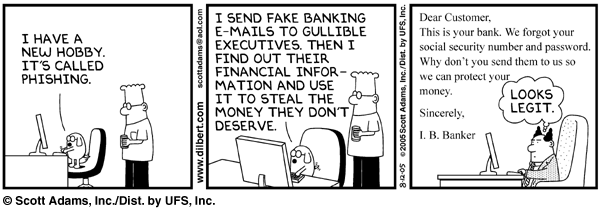The Disadvantages of ICT
ctto: Katrina Gervacio 2018.
Cybercrimes are illegal acts done through the use of the internet. People all over the world use the Internet to commit a host of crimes, some of which the public doesn't even know are capable of being done electronically.
In 2012, Stephen Nale (Complex.com) posted a list of TEN MOST COMMON INTERNET CYBERCRIMES as follows:
1. Phishing and Spoofing
In 2012, Stephen Nale (Complex.com) posted a list of TEN MOST COMMON INTERNET CYBERCRIMES as follows:
1. Phishing and Spoofing
Spoofing attack is when a malicious party impersonates another device or user on a network in order to launch attacks against network hosts, steal data, spread malware or bypass access controls. There are several different types of spoofing attacks that malicious parties can use to accomplish this.
Phishing is the attempt to acquire sensitive information such as usernames, passwords, and credit card details (and sometimes, indirectly, money), often for malicious reasons, by masquerading as a trustworthy entity in an electronic communication.
Difference Between Phishing and Spoofing
The misconception that phishing and spoofing are synonymous, based on nothing more than aesthetic similarities, pervades the Internet. Phishing and spoofing are clearly different beneath the surface. One downloads malware to your computer or network, and the other tricks you into giving up sensitive financial information to a cyber crook. Phishing is a method of retrieval, while spoofing is a means of delivery.
2. Blackmail/Extortion
Extortion (also called blackmail, shakedown, out wresting, and exaction) is a criminal offence of unlawfully obtaining money, property, or services from a person, entity, or institution, through coercion. Refraining from doing harm is sometimes euphemistically called protection. Using the Internet to threaten to cause damage with the intent to extort from any person any money or other thing of value.
3. Accessing Stored Communications
Accessing Stored Communications or hacking; Intentionally accessing, without authorization, a facility through which an electronic communication service is provided. The act of obtaining unauthorized access to data from computer network. This is typically done to commercial and government sites to threaten its owner. In late 2015, a group of Anonymous Philippines hacked the Twitter account of actress Maine Mendoza, who plays the famous character Yaya Dub of the popular AlDub tandem and posted links and messages on the account.
4. Sports Betting
Sports Beating is engaging in the business of betting or wagering on any sporting event or contest over the Internet. In some countries, gambling (including sports betting) is illegal even if you are doing it over the Internet.
5. Non-Delivery of Merchandise
Devising any scheme to defraud, or for obtaining money or property by means of false or fraudulent pretenses, or promises, and using the Internet for the purpose of executing the scheme. The non-delivery scam occurs when the scammer places an item up for sale when there is actually no item at all. The item is subsequently never delivered to the buyer after they purchase the item.
6. Electronic/ Cyber Harassment
Cyber harassment refers to online harassment. Cyber harassment or bullying is the use of email, instant messaging, and derogatory websites to bully or otherwise harass an individual or group through personal attacks. Cyber harassment can be in the form of flames, comments made in chat rooms, sending of offensive or cruel e-mail, or even harassing others by posting on blogs or social networking sites. Cyber harassment is often difficult to track as the person responsible for the acts of cyber harassment remains anonymous while threatening others online. This usually applies to school-age children.
7. Child Pornography
Using the Internet to transmit child pornography. Child pornography is distributed nowadays mainly through the Internet. Child pornography are produced not only on a professional scale by commercial providers, but also privately using victims from the producer’s own environment, from the exploitation of children by clients of child prostitutes. Child pornography is sold over commercial websites and also exchanged in closed groups or via peer-to-peer networks. Criminal groups also use the Internet to make big money selling child pornography.
8. Prostitution
9. Drug Trafficking
Delivering, distributing, or dispensing a controlled substance by means of the Internet. Darknet markets are used to buy and sell recreational drugs online. Some drug traffickers use encrypted messaging tools to communicate with drug mules. The dark web site Silk Road was a major online marketplace for drugs before it was shut down by law enforcement (then reopened under new management, and then shut down by law enforcement again)
10. Criminal Copyright Infringement
Criminal Copyright Infringement, the act of piracy mainly for financial gain. In late 2014, the number one pirate website, The PirateBay, was raided for the second time due to years of pirating movies, music, games, books, and other software. These kinds of websites earn money through advertising.
Combatting Cybercrimes
1. Network Security. Before a hacker can get through the unauthorized files he or she is targeting, the hacker has to get through several security measures like firewalls, secure connections, passwords, anti-malware, and data encryptions. The Disadvantages of ICT 177
2. Investigation. URL tracing and logging are used by websites to track your unique IP addresses. This can be used by investigators to trace hackers. In piracy, trackers are used to identify IP addresses currently sharing a pirated file.
3. Penalties. More and more laws are being created and implemented today. Penalties include both a fine and imprisonment.















EMPOWERMENT TECHNOLOGIES
ReplyDeleteCreate a reflexive piece or output using an ICT tool, platform, or application of choice on the learning experience undergone during the semester
ReplyDeleteCS_ICT11/12-ICTPT-IIt-23.
2. write a reflective essay on how ICT can change the world for better or for worse and your learning about Empowerment Technologies. Present thru:
1. Video blog
2. Presentation or image gallery
3. Website
4. Podcast or webcast
RUBRIC:
CONTENT & RELEVANCE: 40
USAGE OF ANY OF THE 4 FORMS: 10
FB VIEWERS IMPACT THRU INTERACTIVITY: 50
Total 100
NOTE: IN SOCIAL MEDIA INTERACTIVITY
2 LIKES/REACTION/COMMENT=1 POINT